Boi 2024: Slaves, Masters & Domains
by devadmin | January 18, 2024 10:51 pm
Raboyseyee and Ladies,
Slaves, Masters & Domains
This past Shabbis, the heylige Ois walked over to the YILC to hear a prominent rabbi, physician, scientist – and many other titles- talk about end-of-life issues. More specifically, he was discussing halachic issues as they pertain to people already on respirators. Shoin, let’s not wish that on any of our family, friends or people we know and like. And while the talk was quite informative, just as enjoyable was a chance to catch up -for a brief two minutes- with a close chaver the Ois has had since 1969; that is a long time ago mamish.
After commenting on the irreverence of the Ois’s weekly parsha posts, he also praised the content. A huge compliment from one of the smartest guys the Ois has the privilege of knowing. The next topic was a class he had just given the day before. The topic was Jewish slavery, taka a timely subject as slavery was/is the dominant topic of the last few parshas leading up to the exodus from Mitzrayim which unfolds without much fanfare towards the very end of this week’s parsha. Of course, it didn’t happen just like that: First, the RBSO visited ten different plagues upon the oppressors of the Yiddin. Why He waited 210 years -or whatever the real number is- ver veyst? We don’t always chap His cheshboinis (calculations); then again, He doesn’t chap our behavior either. The bottom line: let’s hope He acts much sooner -like in today- on our current enemies. Shoin.
Expecting to hear some new pshat or medrish on this topic, instead, chaver Moish Jeger shared that his topic of interest was slavery of another sort. Was it about man’s role in marriage? Also not! He shared that the Yiddin – some of them- had their own slaves. What? Not during the well-known period of slavery that spanned the years 1776-1865, but while they themselves were enslaved to Paroy over in Mitzrayim. What? Ober, how could that be? Did the heylige Toirah leave something out?
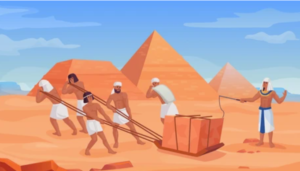
Was he suggesting that while the Yiddin were crying out to the RBSO, while their spirits were mamish broken and they could not listen to Moishe who came along promising freedom from slavery, they were -mamish at the same time- themselves slave-owners? What’s pshat here? How could that be? Did we learn this in yeshiva? Not! Where is this written? The bottom line: he piqued my interest.
Ober my friend Moishe does not ever talk or state a fact unless he’s fully backed up, and in the two minutes we had, he shared with me a bunch of pages of his mareh mikoimis (source sheets). I eagerly accepted. And taka after Shabbis, the Ois decided to skim through Moishe’s handouts -along with his own research- and was mamish shocked to learn that efsher it’s taka so. How was that possible?
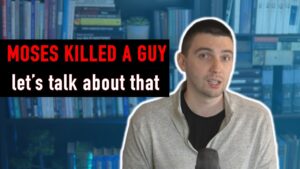
Wait: there’s more! As it turns out, according to many a source (would you believe at least one, maybe a few), not all the Yiddin were enslaved. Avada we all recall learning that Sheyvet Levi -from whence came Moishe, Miriam and brother Aharoin- were not enslaved, but were you ever taught that other shvotim were also not enslaved? And, were you taught that the Yiddin – those not enslaved- may have owned their owns slaves? Neither was the heylige Ois who attended a few yeshivas in his day. Ober, as it tuns out, according to some, at least two other shvotim, those from Reuvain and Shimon -and according to yet another opinion- the tribes from Yoisef -as in Ephraim and Menashe- were also always free to roam about Egypt and make a decent living. They were not enslaved. More on that below.
Let’s read this: According to some, these free people from the above listed tribes, were themselves Jewish slave owners; say it’s not so but you might find yourself arguing with some bigger guns. What’s pshat here? We shall cover this below, but let us begin by checking out the medrish (Medrish Rabbah) which discusses the plague of choisech (darkness). Says the medrish that a bunch of Yiddin died along with their oppressors. How many died? That for another day but according to some sources, many died; some say millions. Is it my imagination or are Yiddin always being killed by the millions? Says the medrish, azoy:
חשֶׁךְ לָמָּה הֵבִיא עֲלֵיהֶן, יִתְבָּרַךְ שְׁמוֹ שֶׁל הַקָּדוֹשׁ בָּרוּךְ הוּא שֶׁאֵין לְפָנָיו מַשֹּׂוֹא פָנִים וְהוּא חוֹקֵר לֵב וּבֹחֵן כְּלָיוֹת, לְפִי שֶׁהָיוּ פּוֹשְׁעִים בְּיִשְׂרָאֵל שֶׁהָיָה לָהֶן פַּטְרוֹנִין מִן הַמִּצְרִיִּים וְהָיָה לָהֶן שָׁם עשֶׁר וְכָבוֹד וְלֹא הָיוּ רוֹצִים לָצֵאת, אָמַר הַקָּדוֹשׁ בָּרוּךְ הוּא אִם אָבִיא עֲלֵיהֶן מַכָּה בְּפַרְהֶסְיָא וְיָמוּתוּ, יֹאמְרוּ הַמִּצְרִיִּים כְּשֵׁם שֶׁעָבַר עָלֵינוּ כָּךְ עָבַר עֲלֵיהֶן, לְפִיכָךְ הֵבִיא עַל הַמִּצְרִיִּים אֶת הַחשֶׁךְ שְׁלשָׁה יָמִים כְּדֵי שֶׁיִּהְיוּ קוֹבְרִין מֵתֵיהֶם וְלֹא יִהְיוּ רוֹאִין אוֹתָן שׂוֹנְאֵיהֶם וְיִהְיוּ מְשַׁבְּחִין לְהַקָּדוֹשׁ בָּרוּךְ הוּא עַל כָּךְ. מַהוּ חשֶׁךְ אֲפֵלָה,
Why did the Holy One, blessed be He, blessed is His name, before whom there is no favoritism and who examines the innermost thoughts and feelings, bring darkness upon them? It is because there were sinners among the Yiddin (Israelites) who had Egyptian patrons, had wealth and honor, and did not want to leave. The Holy One, blessed be He, said: If I bring a plague upon them publicly and they die, the Egyptians will say: Just as it befell us, so it befell them. Therefore, He brought darkness upon the Egyptians for three days so they could bury their dead and their enemies would not see them, and they would praise the Holy One, blessed be He, for it.
What is the medrish telling us? That there were Yiddin who were free, working, or in business, and they didn’t want to leave Mitzrayim; they were happy with their lifestyles. Let’s read that as it appears in the medrish:
שֶׁהָיוּ פּוֹשְׁעִים בְּיִשְׂרָאֵל שֶׁהָיָה לָהֶן פַּטְרוֹנִין מִן הַמִּצְרִיִּים וְהָיָה לָהֶן שָׁם עשֶׁר וְכָבוֹד
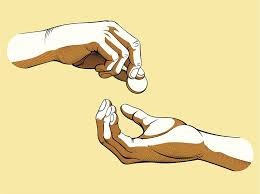
There were wicked Jews who had Egyptian patrons and who had wealth and honor. In other words, these Yiddin were indeed slaves or dependents of these Egyptian masters/patrons, but through their association with said masters, they could amass fortunes of their own. This angered the RBSO and He had them wiped out during the plague of darkness when no one could see. The bottom line: the RBSO did not want the Egyptians rationalizing the plague by suggesting that the Yiddin too were being punished.
Shoin. Let’s chazir: So far we know this: This medrish says that there were Yiddin in favored positions. Are we led to believe that there were Jews that were not enslaved? Or, were they favored while enslaved? Or perhaps they developed these positions over the period of the 10 plagues? Or perhaps they weren’t wealthy and the medrish is but metaphorical and it means they lived “as if” they were wealthy, meaning they had gotten comfortable in Egypt and didn’t desire to be redeemed? Which was it? Ver veyst? It’s medrish; all options are on the table.
Ober, does the heylige Toirah tell us -anyplace- that the Liviyim (Levites) were never enslaved? Not! That factoid notwithstanding, says Rashi –of course relying on the same medrish (Tanchuma)- that it’s taka the case that the Leviyim weren’t enslaved. They were allowed to continue with their priestly lifestyle because the Egyptians were respectful to other nation’s priests. And the rationale for this pshat? Rashi sees it as implicit from the fact that Aharoin was able to go and greet Moishe, and they were both allowed to come and go as they pleased —and even meet Paroy. How would they be roaming so freely if their people were bound in labor? Rather, since the Tribe of Levi was a priestly class, even in Egypt, the Mitzrim allowed them complete freedom. Seemingly, even back then, the tribe of Levi served as the spiritual compass of the -soon to be- Jewish people. Ober the question is this: Why taka did Paroy allow them roam about free? According to one medrish Paroy was aware of the fact that he would one day be punished for enslaving the Jewish people. He hoped that by allowing those from Sheyvet Levi to continue to study the RBSO’s teachings and serve Him, he would be spared from retribution. Perhaps he chapped the need for every nation to have spiritual leaders and guides and therefore kept the tribe of Levi as the guardians of the tradition. Let’s check out the Maharal who says this: Levi was exalted and exempted from the prophecy given to Avrohom that his descendants would be enslaved. Why, ver veyst? Gishmak! Seemingly, Levi caught a hall pass.
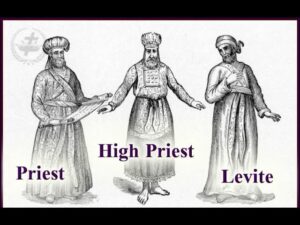
The bottom line: if this is emes, and it does epes appear that it was zicher good to be a Levi, it’s mashma (it appears) that the Liviyim had a knack for evading punishments, at least in the rabbinic imagination. Says the heylige Gemora (Bava Basra (121b) azoy: Rav Hamnuna says that the tribe of Levi was exempted from the punishment of dying in the desert, perhaps because they didn’t participate in the eygel caper (golden calf incident). And while this claim of Levite survival in the midbar seems far -very- from the text of the Toirah, where we read that Moishe, Aharoin and Miram all died, and yes, they were all from that tribe, it is a medrish and of course there must be a deeper meaning even if it’s clearly not factual. In fact, it’s not true at all. What that deeper meaning is, ver veyst? Ober raboyseyee, if the medrish brings it, they had some reason to so state.
And listen to this: as mentioned, there is a well-known idea that the Leviyim were not subjected to the hardships of slavery in Mitzrayim, on account of their unique dedication to Toirah pursuits. However, the medrish states that, from a certain point of view, it was not only the Leviyim who were spared from all those hardships, there were others. Mamish? According to the medrish, the tribes of Reuven and Shimon were likewise subjected to less persecution. Were they being rewarded for bad behavior? Were they being rewarded though their father excoriated them on his deathbed? Says the medrish azoy: “Reuven, Shimon and Levi enjoyed authority status (הנהיגו שררה) in Mitzrayim.” Well blow me down. Seemingly, they caught a break. While their brothers from the other shvotim were subjected to back breaking labor and were crying out bitterly, these three flew under the radar. They were free, or as close to free as one could imagine back there in Egypt. Ober, why were these three tribes different? Says the Meshech Chochmah azoy: the Yiddin of that generation were built to last. They were able to withstand the difficulties of oppression and persecution because they were encouraged and fortified by a consciousness of their role in the future destiny of their people. Their father Yaakov blessed them. However, the brochis (final blessings) Yaakov gave to the first three brothers were not encouraging, neither in tone nor in substance! Farkert! Rather, they consisted of words of rebuke over various no no sins, traits, and tendencies these three brothers exhibited and committed in the various episodes of Bilhah and the city of Shechem. The bottom line: Yaakov never really forgot, nor forgave Reuvain’s actions when he mounted the bed of his own stepmother. As well, he was still hot under the collar for the incident where Shimon and Levi wiped out all the males in the city of Shechem following the rape of their sister Dina. In other words: from this pshat it appears that Yaakov did not really bless them at all. They were not built to last. What to do? The RBSO saw to it that they were never enslaved. Gishmak. The bottom line: one needs strength to endure difficulties. Another bottom line: when the RBSO has your back, you are good, nothing else needed.
Nice pshat, ober what about Jewish slavery? Didn’t the heylige Ois also mention that some of the Yiddin also owned slaves? Could one be a slave and a slave master the same time? And can one taka be slave to and a master of his own domain, if you chap?
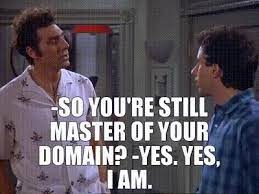
What’s pshat? Let’s read this (if you can; if you can’t read the English just below):
יתכן כי גם אז במצרים היו גדולי האומה אשר היו שרים נכבדים ואפרתים והם היו משעבדים את בני ישראל לעבדים, שמכרו המצרים להם . . . שמכרו המצרים להם . . . לכן ציוה השם יתברךשבני ישראל גם פרעה יוציאו את בני ישראל מהשעבוד.
It seems likely that even then in Egypt, there were greats of the nation who were honored aristocratic authorities and they would enslave their fellow Jewish people whom the Mitrzim sold to them . . .therefore the RBSO -may He be Blessed- commanded that the Yiddin and Paroy remove the Jewish people from the enslavement. Well, blow me down with a feather!
Where is it written that the Jews and specifically these three tribes may have owned their own slaves? Shoin, let’s check out the Meshech Chochma (Vaera 8) innaveynig (lets’ read the text and specifically the bolded text) where he says this:
ויצום אל בני ישראל ואל פרעה כו’ להוציא את בנ”י כו’ יתכן כי גם אז במצרים היו גדולי האומה אשר היו שרים נכבדים ואפרתים והם היו משעבדים את בני ישראל לעבדים שמכרו המצרים להם ואולי היו המה השלשה שבטים ראובן ושמעון ולוי שהנהיגו שררה במצרים כמו שאיתא במדרש נשא פ’ י”ג לוי שלא היה בשעבוד מצרים לכן לא נטל נחלה בארץ, וכן ראובן לא נטל רק בעבר הירדן ושמעון נתקיים עליו אחלקם ביעקב כמוש”פ רמב”ן ומהם היו בני חורין הרבה ושרים אשר היו משעבדים את ישראל הנמכרים להם מהממשלה של פרעה, לכן צוה השי”ת שבני ישראל גם פרעה יוציאו את בני ישראל מהשעבוד
Essentially, the commandment told “to the Jewish People and Paroy to remove the Jews from slavery,” refers not only to the Egyptian leader’s requirement to send us out, but also to the tribes in power who had Jewish slaves. Specifically, Reuven, Shimon, and Levi who did not receive an inheritance in the land proper (inside the Promised Land), had more independence in Egypt to have Jewish slaves. Is this pshat? And here we spent our lives feeling bad for the Yiddin?! And we built a muti hundred-million-dollar business around Pesach during which we celebrate freedom from slavery? Well, blow me down, again! And let’s check out this shtikel Gemora (Talmud Yirushalmi Rosh Hashono Perek 3, Halocho 5) where we read this:
אַתְייָא כַּהִיא דְאָמַר רִבִּי שְׁמוּאֵל בַּר רַב יִצְחָק. וַיְדַבֵּ֣ר יְי אֶל־מֹשֶׁ֣ה וְאֶֽל־אַֽהֲרֹן֒ וַיְצַוֵּם֙ אֶל־בְּנֵ֣י יִשְׂרָאֵ֔ל. עַל מַה צִיוָּם. עַל פָּרָשַׁת שִׁילּוּחַ עֲבָדִים. וְאַתְייָא כַּהִיא דְאָמַר רִבִּי אִילָא. לֹא נֶעֶנְשׁוּ יִשְׂרָאֵל אֶלָּא עַל פָּרָשַׁת שִׁילּוּחַ עֲבָדִים. הָדָא הוּא דִכְתִיב מִקֵּ֣ץ שֶׁ֣בַע שָׁנִ֡ים תְּֽשַׁלְּח֡וּ אִישׁ֩ אֶת־אָחִ֨יו הָעִבְרִ֜י וגו׳.
“The blowing of the shofar depends on the Court but manumission of slaves depends on everybody.” And it follows what Rebbi Samuel ben Rav Isaac said, the Eternal spoke to Moishe and Aharoin and commanded them to the Children of Israel. About what did He command them? About the chapter on manumission of slaves. This parallels what Rebbi Ila said, Israel was only punished because of the Chapter about manumission of slaves; that is what is written, at the end of seven years everyone has to set free his Hebrew brother, etc. on the other hand, the instructions to free their slaves was given.
Before the Yiddin were freed and before Matan Toirah, before they were commanded to any mitzvis (but a few). What’s pshat? Pshat could be that the Yiddin were told that they would be freed on condition that they would in the future manumit their own Jewish slaves on Yoivel (Jubilee)
![]()
Never heard the word manumission? Here is the definition: Manumission and abolition are both used to mean “freeing slaves” or “a release from slavery.” More specifically though, manumission is the act of a slave owner setting slaves free, while emancipation (and abolition) involve government action.
The news gets better: According to some, the tribes coming out of Yoisef – as in Ephraim and Menashe- were also never enslaved. According to another source, they were given high positions. You never heard that? You are not alone and let’s read further. In Divrei HaYomim (Chronicles) it mentions one of Yoisef’s descendants going down from Israel to search for his cattle or sheep. Ok, what’s happening here? And if Yoisef’s descendants as in the tribe of Ephraim and or Menashe or both, were in Israel, they were not in Egypt.
According to the history as delineated in Chronicles, Ephraim’s sons “come down” to raid the cattle of the men of Gath and are killed in the process. Ephraim’s brethren, Menashe and the others, come, presumably from the nearby vicinity, to comfort him. The tribe of Ephraim is thus on the verge of extinction, as Ephraim’s daughters will marry out of the tribe. Thankfully, however, after his period of mourning, Ephraim comes to his wife and she gives birth to a new son. Where is all this assumed to be taking place? The context virtually mandates that this is happening in the land of Israel, not in Mitzrayim. The bottom line: Where was the tribe of Ephraim while the Yiddin were enslaved? Israel or Egypt? Ver veyst? As an aside, one medrish tells us that the Ephraimites left Egypt on their own -some 30 years before redemption and were mostly killed by the Philistines.
The bottom line: As it turns out, not all Yiddin were alike; some had and some did not. Some were privileged, others, not so. Another bottom line: not much has changed.
A gittin Shabbis!
The Heylige Oisvorfer Ruv
Yitz Grossman
Source URL: https://oisvorfer.com/boi-2024-slaves-masters-domains/